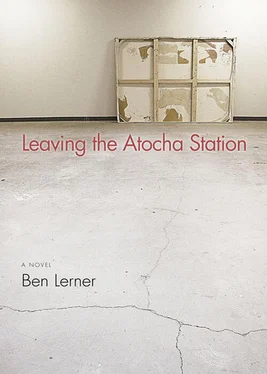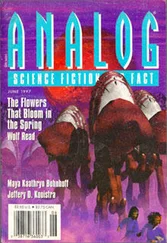“You smoked without us, Adán,” Rufina exclaimed. She must have asked Isabel my name.
“I can make more,” I said. “I can roll another,” I corrected.
“So you’re a poet, Adán,” she ignored me. I just smiled. She repeated my name as if it were a one-word joke at my expense.
“He just read at a gallery in Salamanca,” Isabel said to spite me.
“Salamanca — elegant!” It was clear Rufina was going to ask me what kind of poetry I wrote. “What kind of poetry do you write?.”
“What kinds of poetry are there?” I was pleased with this response and made a mental note to use it from then on.
“Bad and worse,” Rufina said with mock derision. Isabel laughed a little. Maybe it relaxed them further to be allied against me, to taunt the new boyfriend after clearing the air of the old.
“I, too, dislike it,” I said in English.
“You must come from money,” Rufina said, ignoring me again. Then she said something idiomatic involving hands and clouds, which I assumed was a colorful way of saying the same thing. “Do you have to work at all?”
I wasn’t sure how to respond to this. I had encountered this association of poetry and money before in Spain, compounded, in my case, by the assumption that all Americans, I mean Americans abroad, were rich; compared to Isabel and Rufina, my family probably was. I had no clear sense of Isabel’s class position, let alone Rufina’s; I knew Isabel had graduated from college. had long worked at the language school, and now had a nice enough apartment, but she also had two roommates. I paid for almost all of our meals and drinks, but thought very little of it, even though it was a significant portion of my total funds, because euros always seemed fake to me. I had no idea, for instance, if the house we were in was of significant value, if land near Toledo was worthless or in high demand, if Rufina’s manner of dress or address indicated the working or middle or some other class, or if those were the relevant terms for Spain.
“I won’t have to work for several months, it’s true,” I said in a way that implied I would then have to work in a coal mine. “Unless you think writing is work.”
“What will you do when you go back to the United States?” Rufina asked. Perhaps the most important unspoken rule that Isabel and I had developed in our short relationship, our most important kind of silence, was never to refer to the time after my fellowship. I looked at Isabel. It had been a while since I’d thought what I would, in fact, do upon my return.
“I don’t know that I will go back,” I lied. Isabel remained quiet, but there was a change in the intensity of her silence. I lit a cigarette to distance myself from this statement.
“And your parents will send you money,” Rufina laughed, and then said something that involved the word “Bohemian.” “What,” she said, “do they do?”
I knew that no matter what I said my parents did, Rufina was going to find it hilarious, so I decided to tell the truth, although I knew it would be particularly funny: “They’re both psychologists.” I heard Isabel shift uncomfortably.
As expected, this cracked Rufina up. I assumed the flourish of talk that followed was about the preposterous image of a Bohemian poet supported by his psychologist parents. Isabel said something about not being too hard on me, but I smiled to indicate I was fine with being teased. “Isabel’s friends from the language school are always rich,” Rufina explained to me. “Friends” clearly meant “boyfriends.”
“What is your profession?” I asked, sounding intensely foreign.
“I lost my job,” she said, flatly. I blinked. “Maybe I’ll start writing poetry. Maybe,” she said, leaning forward and placing her hands on my thighs, “you’ll marry me and we can live off your family.” I thought I saw Isabel wince when Rufina touched me.
“O.K.,” I said.
“Do you think your parents would like me?” Rufina asked, sticking out her chest in a performance of her voluptuousness I didn’t quite understand, but enjoyed taking in.
“I think my mom and dad would like you,” I said.
“I can cook and clean,” she said, sarcastically, crossing and uncrossing her legs.
“My mom is a well-known feminist,” I said, a statement that sounded as stupid as it was. Rufina laughed, Isabel asked what time it was, implying we should leave, but was ignored. I could see her staring at Rufina, mutely telling her to shut up; I didn’t understand the extremity of her concern. “You’d like my mom,” I said to get further away from the feminist thing, “but she’s not so rich.” I smiled again, in part to calm Isabel. “Neither she nor my father ever give me money,” I lied. Now Isabel was looking at me strangely. I had just finished saying maybe Rufina could meet my parents if and when they visited Spain, when I remembered I’d told Isabel that my mom was dead.
There were several ways I could have recovered from this mistake; I could have looked melancholy and later claimed that I simply refused to share such a loss with Rufina, or, if I’d kept my cool, I could have maintained to Isabel that she had misunderstood my terrible Spanish in the first place, that I’d never said or meant to say that my mom had passed away. But I could feel my face, which was burning, fully confess to Isabel that I had lied to her. I’d told Isabel the lie during one of our first nights together when, still guilty from having recently told it to Teresa, I had felt compelled to repeat it, maybe to deepen my guilt into a kind of penance; surely I’d been drunk. Instead of amplifying my guilt, however, repetition mitigated it. While she had responded tenderly, Isabel never asked me about my family, and I never returned to it; at first I’d been aware of needing to avoid talking about my mother, as I still was with Teresa, but with Isabel I avoided talking about almost everything, save for my cryptic aesthetic pronouncements.
Isabel said she had to piss again and left the porch. Rufina, confused about what had passed between us, didn’t resume her sarcastic inquiries, and in the ensuing silence, I tried to imagine how Isabel was going to react. My lie would be unforgivable in any context, but I felt it would be particularly unforgivable in Spain; had I told the lie about my father, that might have been O.K.; I could always say he was a fascist, whatever that meant, and that I’d merely engaged in wishful thinking. Almost every movie I had seen since arriving in Spain, maybe every Spanish movie made since 1975, was about killing, literally or symbolically, some pathologically strict, repressed, and violent father, or was at least about imagining a Spain without such men, a Spain defined by liberated women rediscovering their joie de vivre with the help of their colorful gay friends. But to have “killed” my mother, the “feminist,” for whatever reason, revealed me to be at heart a right-wing, jackbooted misogynist, and further called into question the legitimacy of my research.
“I told Isabel earlier,” I said slowly to Rufina, who, smoking again, appeared to have forgotten all about me, “that my mother was dead. This isn’t true.”
“What?” she asked, suddenly interested, but sure she’d misunderstood.
“I told her my mom was dead, but my mom is alive,” I paused. “Just now, I forgot I had lied.”
“My God,” Rufina said, and gasped. “Why did you do that, Adán?” She was more intrigued than disgusted. She was smiling, not unkindly.
“Because my mom is sick,” I said. “And because—” I pretended it was difficult to go on. The smile drained quickly from her face. Then it was difficult to go on: “I am scared … I was trying to imagine …” Rufina leaned forward, now all tenderness. “I thought if I said it, I would have less fear,” is how I must have sounded.
Читать дальше












